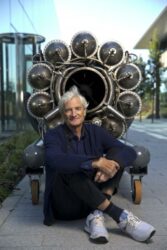Dyson has taken a step forward in its plans to start selling a “radical” electric car from 2020— but is keeping quiet about the battery technology involved.
The UK firm, best known for its vacuum cleaner innovations, has unveiled plans for a 10-mile EV test track at a former Royal Air Force base in Wiltshire, which the company bought last year.
CEO Jim Rowan said last week the company is now “firmly focused on the next stage of our automotive project, strengthening our credentials as a global research and development organisation”.
Rowan said Dyson has already spent £84 million (US$109m) on redeveloping the Wiltshire test track site and the next phase will take the total investment up to £200m.
Last month, Dyson inventor and entrepreneur Sir James Dyson said the company was doing something “quite radical” in terms of its proposed electric vehicle, but was coy about what the project involved.
However, Sir James has said previously “wherever we make the battery, we’ll make the car, that’s logical”.
Asked about the battery tech to power the proposed EV, a Dyson spokesperson told BEST Battery Briefing “we are not commenting further on our battery technology at the moment”.
In October 2015, Dyson bought Sakti3, a start-up that was working to produce solid-state lithium-ion batteries, but Dyson relinquished the core intellectual property of the firm in April 2017, eight months before Sakti3 founder and battery expert Anne Marie Sastry and Dyson parted ways.












